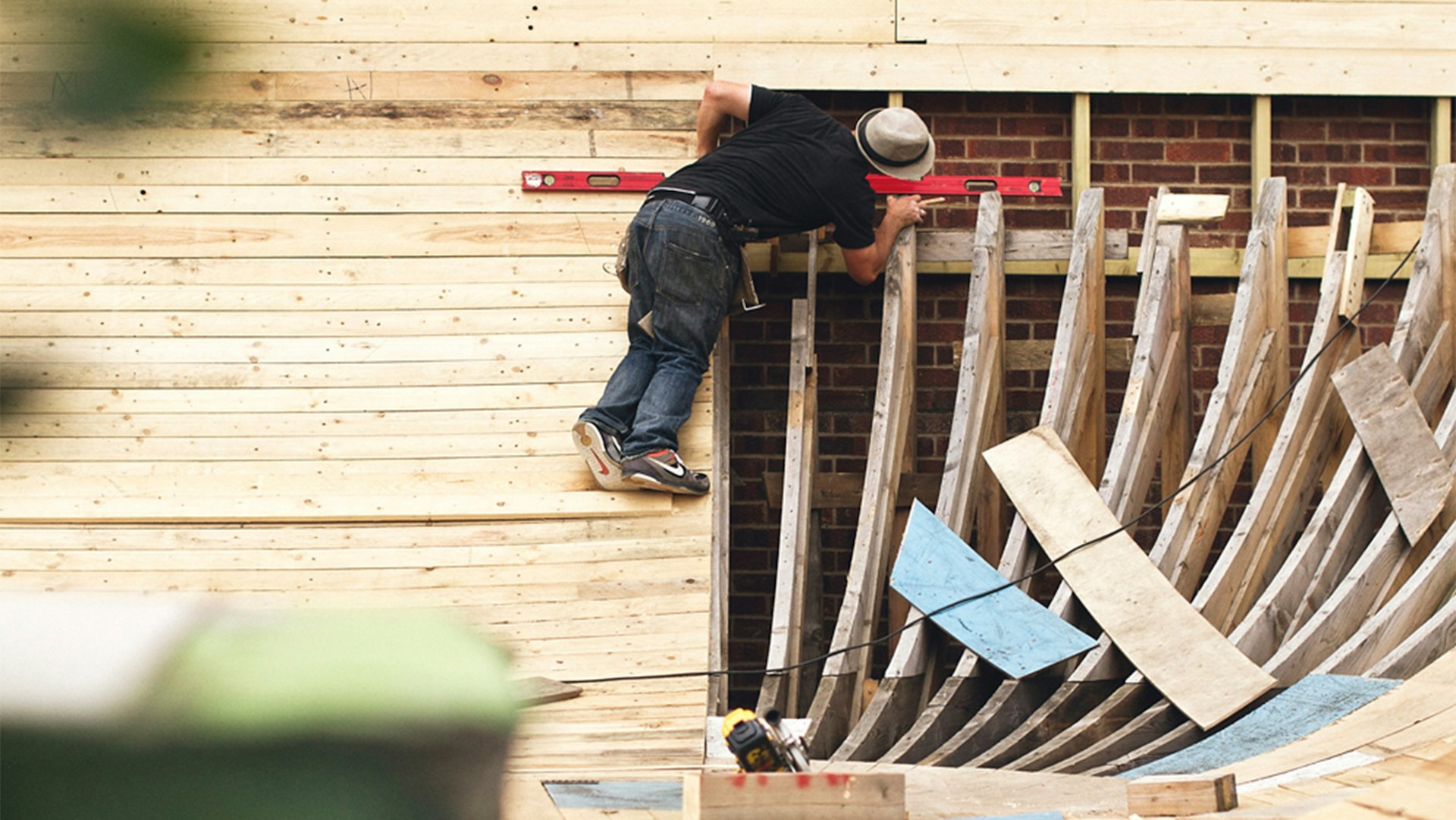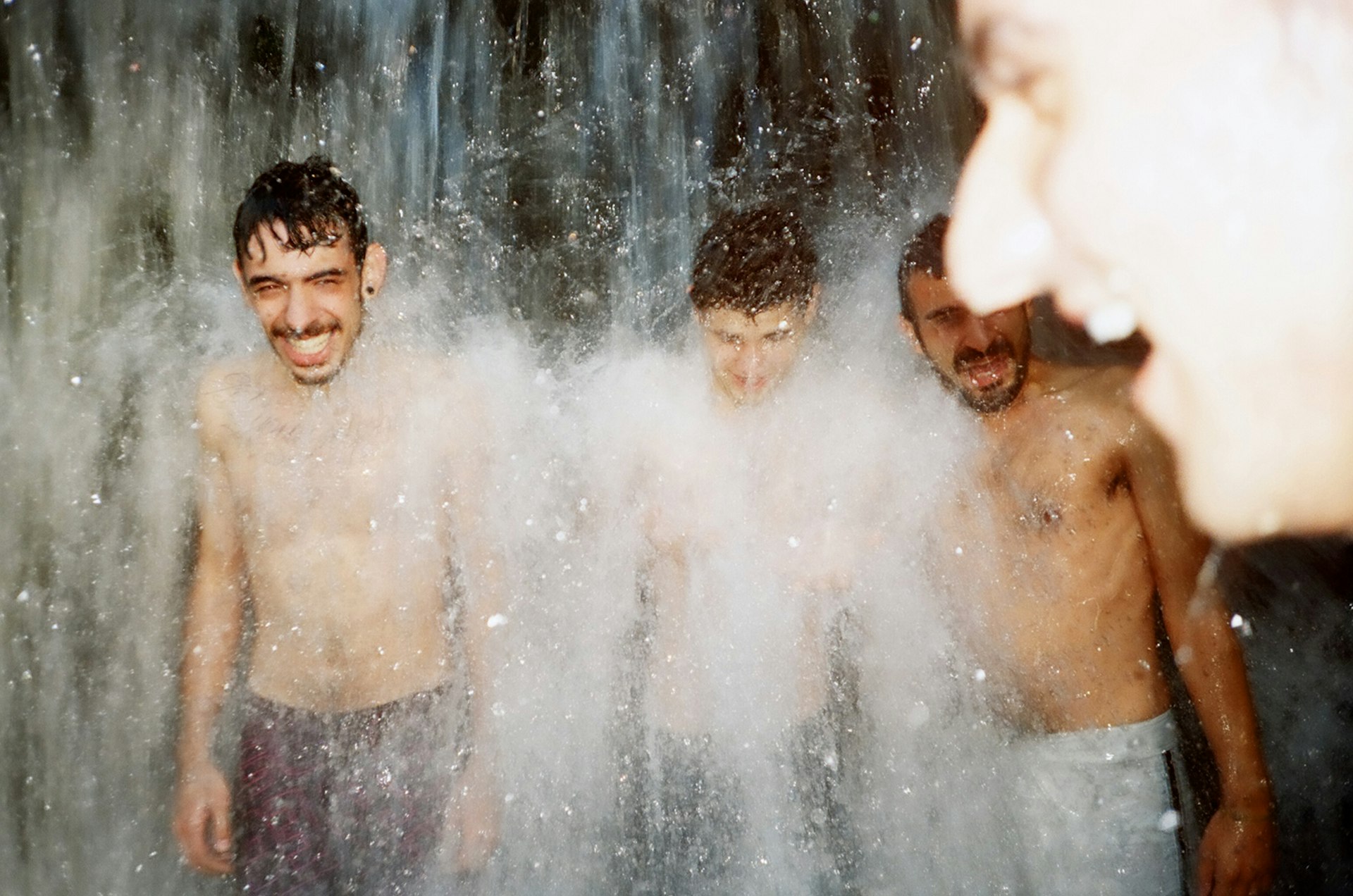
Frontside Gardens
- Text by Alex King
- Photography by Adrian Morris
Nestled among run-down industrial buildings and shabby-chic artist studios, Frontside Gardens shows how an unloved piece of land can be turned into a centre of community. With a minuscule budget and some reclaimed materials, Andrew Willis has created a solid skate spot and social hub in Hackney Wick. He was originally awarded a 3 month lease by the London Legacy Development Corporation on a small plot scheduled for development as part of the post-Olympics regeneration plan. The park was never meant to be permanent, but the project’s success won Andrew a year extension to the lease and a small grant to help transform Frontside into his vision of a dope skatepark. He talked to Huck about the value of public space, re-using materials and how to build community.
The idea
“I just want to build skateparks and here it was nice to have full control of the design and feel of the place. The ethos behind it was to see what you can do with a little piece of land, a little bit of money and a lot of reclaimed materials.”
Building blocks
“Some of the metal came from Horseguards Parade, where the Olympic volleyball courts were. They’d taken down lots of temporary steps and there was also lots of quite nice buffalo board which I used for the decks of some of the ramps. I got a few bits from the Olympic park and local businesses supplied tyres and plastic tubs to use as planters. The plants came from a local nursery and had got to the end of the season and were just pots full of roots. Lots of other stuff came from various other sites, unwanted junk from here and there.”
Reclaim, re-use
“I studied Civil Engineering at uni and always enjoyed trying to make things sustainable. I have a respect for engineering in developing countries; using raw materials and simple techniques but getting a lot out of what you’re working with. I’ve looked after a skatepark with a group of friends for a long time and we’ve always made use of random bits of waste materials from road works, such as gas pipes, and bits of wood from people building extensions on houses. A culture was born there which I’ve always wanted to push to the limit by making something out of reclaimed materials alone.”
More than money
“There are really good skateparks going up all the time at the moment, but they often cost hundreds of thousands of pounds. I wanted to show how much you could do with just a few thousand pounds, the right effort and enough enthusiasm.”
Creative spaces
“I love art and film, and how they are integral to skateboarding. We’ve had screen printing workshops, t-shirt tie-dying sessions and film premieres at the skatepark. And it’s nice having graffiti artists in and doing their own thing in their own time when people aren’t skating. We’ve ended up with a good relationship with locals who come in and always put a strong effort in. I’m not from here, but it’s nice to design structures or spaces like this that are in touch with the environment and constantly adapting to the area. The feature wall just happened organically because I had lots of people come in and asking to paint.”
Positive environments
“Community space is extremely important. You have to break up residential and commercial areas with public spaces and parks. You need areas where you can just breathe for a second. People can meet, hang out together and just be outdoors. Most people in London don’t have a garden, so it’s nice to have a little projects like this where people can do things outside. That’s why I’ve tried to dedicate about a third of the space to just hanging out, so people can come in and chill.
“I got into skating because there was a little ramp and a little park somewhere near where I lived and you don’t see that in a lot of the bigger cities. A city without public spaces would suffer because people wouldn’t want to live there. Bad environments create trouble and antisocial behaviour because there’s nothing fun or constructive for people to do.”
South Bank
“I hope the South Bank stays because it’s loved by skaters. They have worked very hard to get the Long Live South Bank campaign up and running and taken seriously, so it’d be a nice model for people power. I hope this place does help that cause to some degree by showing that the more places to skate, the better. South Bank is one of the few undercover spaces in London that you can actually skate. It shouldn’t be that they’re relocating it, they should be adding to it. It will be interesting to see if I can have some sort of impact on the area, as a model making sure people have spaces; places to meet up and do their own thing. I’d love to see more public spaces and especially more public skate parks.”
Girls
“I always put effort into helping promote the girls’ scene. I’m friends with Jenna Selby, who runs Rogue, a girls only skate company. I’ve helped out with a few of her events and I’m enthused by what she’s done over the years. We’ve done quite a few girls only sessions and we’d like to run more. I don’t think it works for all people, it’s not a rule. Some girls hang out and skate with groups of lads. But for those girls who hadn’t skated before, they said it helped them as it was less intimidating.”
Community
“The park has definitely helped build a community, especially among the younger age groups. If you’re young, you’re not allowed to go and travel to the skate park a couple of miles away. Giving kids something to do on a daily basis, without having to go to their parents or spend any money is important to me, so I run regular free sessions for under 16 year olds.
“All the local kids who skate have come together, a groups of friends who know each other from the different skateparks in the area, and this has now turned into their little home. They want to be here every day, so whatever you charged it would quickly add up. We also have a licensed bar which also attracts an older crowd. The over 30s thrash it late into the night. They like skating with the kids, and there’s often that transition period where they all skate together, which is always nice to see.”
Waste
“Wastage does upset me. I worked at festivals and large events for a long time, often setting up skateparks. We would be there at the end taking down ramps and see thousands of things thrown away. Because we always worked with big vans we could load them up with various things people had just left behind; damaged stock, building materials, or just even punters leaving tents behind full of sleeping bags. I’ve got a general enthusiasm for less waste and always try to re-use materials wherever possible.”
The future
“I want to do something permanent in the area. An indoor park would be a dream. There aren’t enough indoor spaces to skate in London. Much as I love to be outdoors, the skate scene needs somewhere indoors to get through the winter. That would be something I’d really like to work towards.”
Make it happen
“If there’s an opportunity to do something, go for it. Don’t wait for everything to be perfect, it doesn’t happen. The sooner you get started, the sooner you will know whether it can work or not. You’ll always learn something in the process.”
Frontside Gardens is now shut for the winter, but get yourself over the Frontside Facebook page to be in the loop when it’s back in action.
